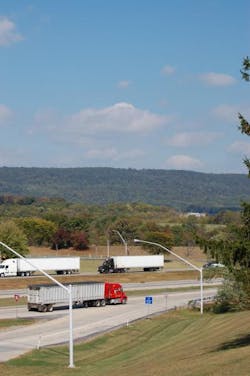And while political ideology is certainly driving the current fiscal standoff, there’s another far broader factor at work as well, one that holds big implications for the freight market: who gets less from here on out in terms of U.S. fiscal policy.
“The reason why Washington D.C. is the way it is right now is we are arguing about who gets less in the future, not who gets more,” explained Noel Perry, senior consultant with research firm FTR and president of economic consulting firm Transport Fundamentals, during a round table discussion with reporters a few weeks back.
“The key thing to understand here is that someone gets hurt no matter what the fiscal answer is,” he said, noting that the current level of deficit spending by the federal government can only be sustained for about 10 more years. “I’m confident we can get through it, but it will be very difficult.”
Another reason the battle over U.S. fiscal policy is becoming so deadlocked centers on the “slow growth” economic pattern that’s been in place for much of the world since the Great Recession ended over four years ago – an economic growth pattern that holds both good and bad portents for the freight market, said Perry.“That’s our biggest worry to confront; are we now in a period of slow [economic] growth?” he asked rhetorically during his sit-down with reporters. “A service economy is far less cyclical than an industrial economy and [the former] is what we are in. We will get back to the U.S. economy’s [pre-Great Recession] starting point, but as a service economy, it will take us two years longer.”
The good news – if it can be called that – is that the U.S. remains one of the world’s strongest economies. Probably the best characterization of this came from Eli Lustgarten, senior VP at economic with Longbow Securities, a few weeks back during a presentation at FTR’s annual Transportation Conference: “The U.S. is the best house in a lousy neighborhood.”
Yet even though the U.S. economy remains “on the mend” in his view, he projected GDP growth of only 2% to 2.5% for 2013 and 2014 – predictions that, even before the ongoing fiscal showdown in Washington D.C. began destabilizing the economic applecart, translated into a slow-growth future with muted industrial demand.
“I’m actually very optimistic for the next three to five years, but that’s if we can survive the next 12 to 18 months,” Lustgarten pointed out.
Indeed that’s the real “Gordian Knot” in all of this: can a U.S. fiscal deal be brokered that will incorporate the new “slow-growth-and-you-get-less” economic realities faced by our nation? We can only wait and see.





